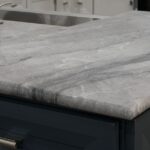We can all agree that natural stone is great. It has a great look, can be very resistant, and is usually anyone’s first choice. Natural granite is a good example, being quite sturdy and long-lasting. However, keeping your options open is always good, and sometimes composite stone is the best tool for the job.
People tend to look down upon composite stone, because it’s man-made instead of being natural. However, it has some nice properties that can make it a good addition to your home. If you’re more interested in utility and cost-benefit, it might be a great option.
So, let’s talk a bit about what makes it special.
What Is Composite Stone?
Composite stone, also known as engineered stone, is a kind of composite material, as the name implies.
Composite Materials
A composite material is a material composed of two or more different materials. This is done in order to improve their properties by mixing up the properties they have by themselves. It makes something that is the best of both (or more) worlds.
Composites, as they’re usually called, are used a lot in engineering in order to make widely used materials become stronger and more durable.
For example, concrete. Concrete is widely used to make buildings because it can resist a lot of compression. That is, you can put a lot of weight on top of it without making it break. It’s one of the strongest materials that we use on a daily basis.
However, it’s not nearly as good at handling traction. That is, it’s much easier to breaking it by pulling it than by putting weight over it. That can be a big problem when making some large structures like stadiums and highways.
To solve that, engineers started adding steel reinforcing bars into concrete (that is, rebars). Steel is much better with traction, so this allowed for some impressive structures to be built. And so reinforced concrete was born.
What Is Composite Stone Then?
With composite stone, it’s similar. It was created to improve natural stone and make it work better for some cases.
It is created by mixing particles of some kind of stone and mixing it with some kind of resin, such as some type of plastic or natural wax. The proportion is usually of about 95% stone to 5% resin.
While this may look like it would make the stone weaker, the resin is carefully selected to make the adhesion really strong, so it can last almost as long as natural stone.
This brings two main advantages: composite stones are harder and much less porous than natural ones.
Natural stones are formed from small sand particles being compressed and heated over long periods of time. During this time, those particles fuse together in part. This makes them adhere to each other very strongly, but the gaps between the particles still remain in some form.
And those gaps that remain are what make the stone porous. And porosity means that liquids can get into it. This is the main cause of stains: liquids with strong colors, like coffee and wine, can get into the pores and dry out, leaving their pigments there. Natural stones are usually sealed to help prevent that, but the sealer doesn’t last forever.
Composite stones, on the other hand, already have all their pores saturated with resin, so it doesn’t have as much problem with that. When it stains, it’s mostly the resin’s fault, but that can generally be solved a bit more easily.
Being less porous is also what makes it stronger. Porosity makes any material less resistant, so filling the pores gives the stone a nice advantage. Composite stones resist cuts and slashes much better than natural ones, and aren’t as prone to cracking and chipping.
Quartz Countertops
Quartz countertops are the best example. They are used so much that people just refer to it as “quartz” instead of “engineered quartz”. It’s the engineered version of quartzite, but may as well be more famous than its natural counterpart.
People really like quartz because it’s extremely hard and looks great. It’s not as hard as quartzite, but it’s still harder than granite. Its white version is very clean and looks like marble, making it a fine pick for any house.
However, being so hard and not very porous, it needs much less maintenance than marble, making it much more suitable for kitchen countertops, for example.
When Should You Use It?
Even though composite stone has some great properties, you can’t use it everywhere. Unfortunately, even though the resin is able to make it need much less maintenance, it’s also the weakest link in the slab.
For example, being made of plastic or wax, it’s quite weak to heat. While they don’t exactly melt, they’re similar to rubber in that heat can make them degrade. So, slowly, over time they start to lose their strength. And when they’re kept somewhere that’s too hot, they degrade much faster.
Of course, that doesn’t necessarily mean that you can’t put them in the kitchen. If you can bear to stay in the kitchen while you’re making dinner, it should be fine. Polyester resins, for example, can resist up to 170 °F, so you probably won’t manage to make countertop break overnight.
However, keeping it outside is a problem. The heat from the sun can be pretty intense, and may even end up etching the resin, giving it a less than ideal appearance. So it should be used only indoors.
Too Hard To Decide? Give Us A Call
Choosing a stone for a countertop can be pretty difficult. There are many possible stones to choose from, all with different features and appearances. Figuring which one is the best one to use in the different rooms in your home can be quite complicated.
Fortunately, here at Eagle Stones we specialize in stone countertops and can help you out. We have a team of specialists which handle both selection and installation of stone slabs, and we are at your disposal.
Get in contact with using our contact form, and we will send you a specialist to figure out the best stones to use for your home. It’s a free estimate, no strings attached.
It’s definitely the best way to pick a countertop!



